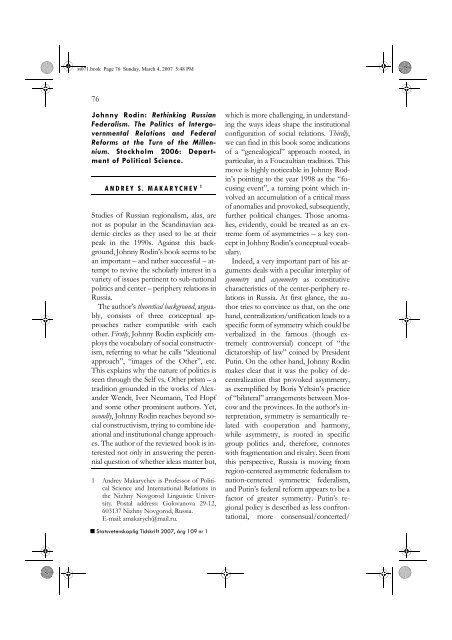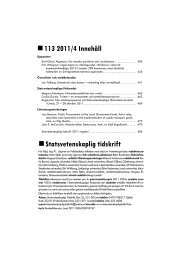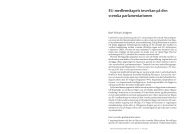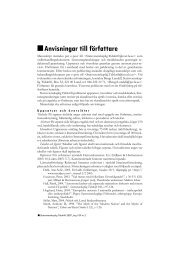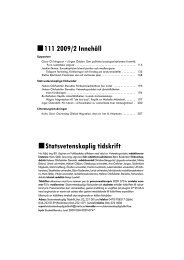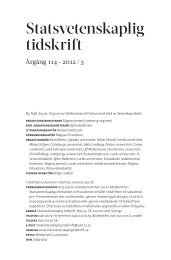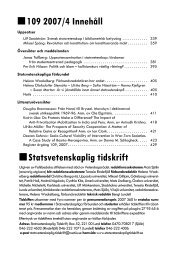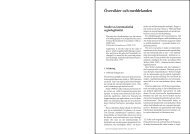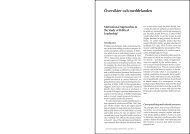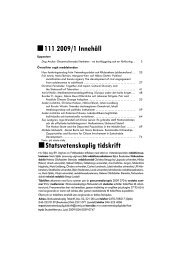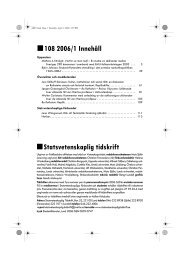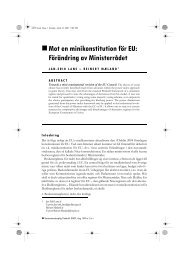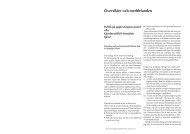Hela nummer 2007/1 (PDF, 2047 kb) - Statsvetenskaplig tidskrift
Hela nummer 2007/1 (PDF, 2047 kb) - Statsvetenskaplig tidskrift
Hela nummer 2007/1 (PDF, 2047 kb) - Statsvetenskaplig tidskrift
Create successful ePaper yourself
Turn your PDF publications into a flip-book with our unique Google optimized e-Paper software.
st071.book Page 76 Sunday, March 4, <strong>2007</strong> 5:48 PM<br />
76<br />
Johnny Rodin: Rethinking Russian<br />
Federalism. The Politics of Intergovernmental<br />
Relations and Federal<br />
Reforms at the Turn of the Millennium.<br />
Stockholm 2006: Department<br />
of Political Science.<br />
ANDREY S. MAKARYCHEV 1<br />
Studies of Russian regionalism, alas, are<br />
not as popular in the Scandinavian academic<br />
circles as they used to be at their<br />
peak in the 1990s. Against this background,<br />
Johnny Rodin’s book seems to be<br />
an important – and rather successful – attempt<br />
to revive the scholarly interest in a<br />
variety of issues pertinent to sub-national<br />
politics and center – periphery relations in<br />
Russia.<br />
The author’s theoretical background, arguably,<br />
consists of three conceptual approaches<br />
rather compatible with each<br />
other. Firstly, Johnny Rodin explicitly employs<br />
the vocabulary of social constructivism,<br />
referring to what he calls “ideational<br />
approach”, “images of the Other”, etc.<br />
This explains why the nature of politics is<br />
seen through the Self vs. Other prism – a<br />
tradition grounded in the works of Alexander<br />
Wendt, Iver Neumann, Ted Hopf<br />
and some other prominent authors. Yet,<br />
secondly, Johnny Rodin reaches beyond social<br />
constructivism, trying to combine ideational<br />
and institutional change approaches.<br />
The author of the reviewed book is interested<br />
not only in answering the perennial<br />
question of whether ideas matter but,<br />
1 Andrey Makarychev is Professor of Political<br />
Science and International Relations in<br />
the Nizhny Novgorod Linguistic University.<br />
Postal address: Golovanova 29-12,<br />
603137 Nizhny Novgorod, Russia.<br />
E-mail: amakarych@mail.ru.<br />
■ <strong>Statsvetenskaplig</strong> Tidskrift <strong>2007</strong>, årg 109 nr 1<br />
which is more challenging, in understanding<br />
the ways ideas shape the institutional<br />
configuration of social relations. Thirdly,<br />
we can find in this book some indications<br />
of a “genealogical” approach rooted, in<br />
particular, in a Foucaultian tradition. This<br />
move is highly noticeable in Johnny Rodin’s<br />
pointing to the year 1998 as the “focusing<br />
event”, a turning point which involved<br />
an accumulation of a critical mass<br />
of anomalies and provoked, subsequently,<br />
further political changes. Those anomalies,<br />
evidently, could be treated as an extreme<br />
form of asymmetries – a key concept<br />
in Johhny Rodin’s conceptual vocabulary.<br />
Indeed, a very important part of his arguments<br />
deals with a peculiar interplay of<br />
symmetry and asymmetry as constitutive<br />
characteristics of the center-periphery relations<br />
in Russia. At first glance, the author<br />
tries to convince us that, on the one<br />
hand, centralization/unification leads to a<br />
specific form of symmetry which could be<br />
verbalized in the famous (though extremely<br />
controversial) concept of “the<br />
dictatorship of law” coined by President<br />
Putin. On the other hand, Johnny Rodin<br />
makes clear that it was the policy of decentralization<br />
that provoked asymmetry,<br />
as exemplified by Boris Yeltsin’s practice<br />
of “bilateral” arrangements between Moscow<br />
and the provinces. In the author’s interpretation,<br />
symmetry is semantically related<br />
with cooperation and harmony,<br />
while asymmetry, is rooted in specific<br />
group politics and, therefore, connotes<br />
with fragmentation and rivalry. Seen from<br />
this perspective, Russia is moving from<br />
region-centered asymmetric federalism to<br />
nation-centered symmetric federalism,<br />
and Putin’s federal reform appears to be a<br />
factor of greater symmetry. Putin’s regional<br />
policy is described as less confrontational,<br />
more consensual/concerted/


